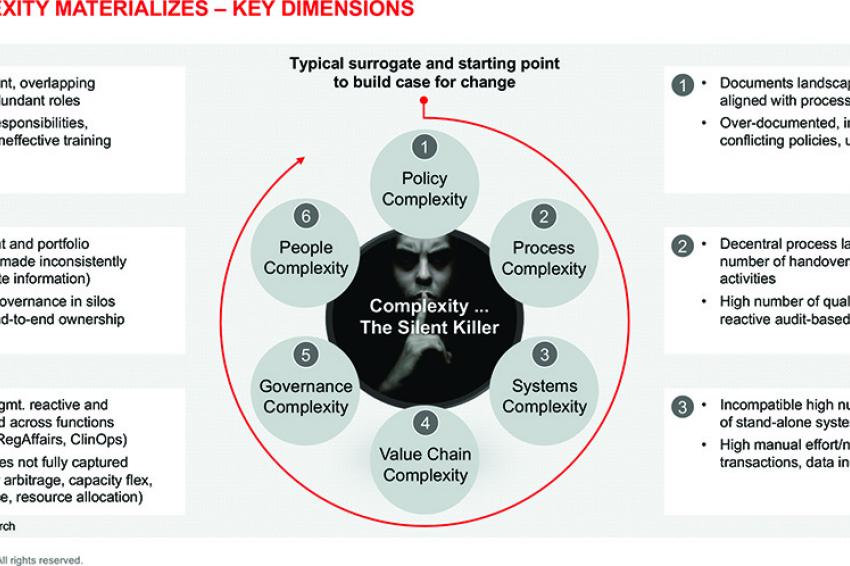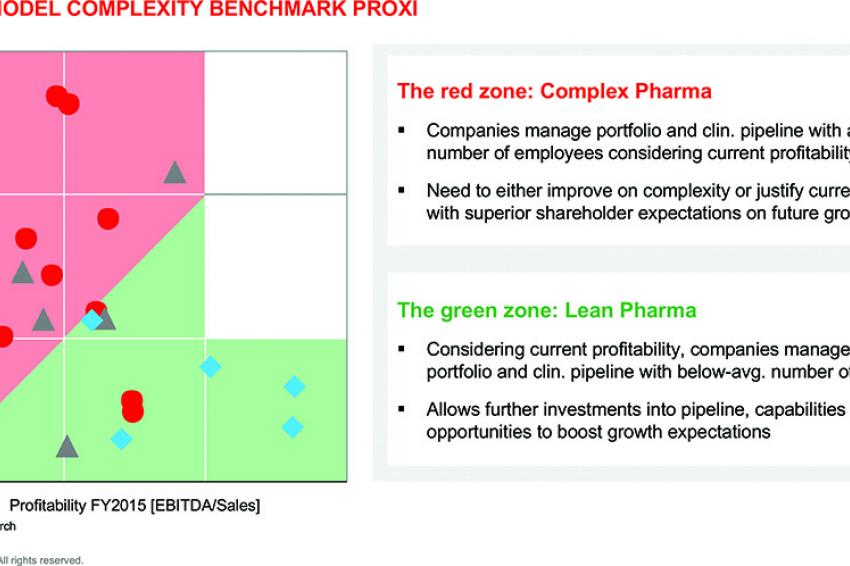Cutting the Gordian Knot of Pharma Operating Model Complexity
How Radical Simplification Can Fuel Growth and Boost Competitiveness
Pharmaceutical companies have traditionally had complex operating models, but in recent years, complexity has reached a whole new level. Instead of continuously assessing their set-up, many organizations have sought quick fix solutions to events like acquisitions, portfolio shifts or negative regulatory inspections.
At a time when healthcare leaders are looking to transform their business models to enable them to capture value from digitalization and data monetarization, radical simplification initiatives are critical. As flexibility, scalability and agility in pharmaceutical operating models will be the new drivers of performance, simplification is now a prerequisite for growth and competitiveness.
Complexity Hampering Growth Potential
After years of sluggish growth, the pharmaceutical industry is on the upswing again. Accenture Research shows that between 2014 and 2016, the FDA approved 108 new molecular entities – an increase of more than 12% compared to the period 2011 to 2013. In 2016, earnings of some of the top pure play pharmaceutical companies also increased. Furthermore, clinical pipelines also paint a promising picture with next generation treatments in development, for example, immuno-oncology, anti-interleukin mAbs and gene editing.
Capturing growth opportunities, however, requires pharma leaders to overcome the complexity that often drags them into a vicious cycle of inefficient processes, limited performance transparency, increasing compliance risk and deteriorating profitability. Agile pharmaceutical companies will have the advantage in today’s world where healthcare segments are converging and new technology is reinventing business models. For instance, many leading pharmaceutical players are actively looking into shifting from being drug makers to taking on a broader role in the health ecosystem, where medicines are just one part of holistic treatment solutions.
Pharmaceutical companies can capture such growth opportunities by simplifying operating models. However, many have not yet embarked on that journey. Accenture research has found that some pharmaceutical companies have focused on mastering complexity when in fact they should be focusing on minimizing it. Complexity has steadily increased and now has reached a level where more than 50% of the 20 largest global pharma companies demonstrate operating model complexity levels disproportionate to their profitability.
Complexity Is a Competitiveness Killer
75% of 59 pharma executives that Accenture surveyed confirm that reducing complexity is a key enabler for sustainable cost reduction. However, only 19% agree that their company is consistently able to identify and remove business activities that do not add value.
Indeed, complexity is difficult to identify and remove, as it is deeply rooted in today’s operating models – and mindsets. In fact, many stakeholders – particularly middle management – have an interest in preserving complexity as their jobs depend on it.
Complexity often stems from acquisitions, new forms of collaboration, scientific innovation and increasing regulatory scrutiny. It manifests across all key pharma functions and is an increasing concern in preclinical research, clinical development, manufacturing and supply chain. Complexity often cuts across everything from policies and processes to systems, the value chain configuration, the governance model as well as the organizational and workforce dimension.
From Lean Six Sigma to Radical Simplification
Traditionally, pharmaceutical companies have often aimed to simplify by pruning their portfolio or streamline individual processes by applying proven methods which deliver incremental improvements, such as Lean Six Sigma. While this approach continues to provide value to business, it is often too one-dimensional and not effective when it comes to transforming into agile and simple pharma operating models. Whereas Lean Six Sigma reduces process variation, improves process control and reduces waste, companies should challenge the process itself.
Radical simplification requires an entrepreneurial mindset and follows a zero-based approach. Technology can substantially help reduce complexity when organizations use automation, robotics and artificial intelligence. In addition, it is essential for leaders to have a start-up spirit, looking for innovative ways to improve speed-to-patient, quality, compliance and cost base.
A pharmaceutical company’s risk and return portfolio should serve as a starting point for simplification. Although many pharma businesses do not have a clear picture of their risk exposure and profit drivers across the value chain, exhaustively identifying and evaluating impact and likelihoods of potential opportunities and threats across patient safety, regulatory, legal and business risk is a valuable baselining exercise. Then, leaders can derive fit-for-purpose measures against their risk and return portfolios, which are typically much simpler and more effective compared to what has typically been there. Instead of incrementally improving an over-complex model, a redefinition of the important pieces often creates a much higher impact.
When organizations embark on a simplification journey, it is important to make resulting effects stick. Sustaining a simple and agile pharma organization is as difficult as creating one – so working on culture and behavior, governance mechanisms and continuous improvement models is a critical final step towards making biopharma operating models deliver superior outcomes for making patients’ lives better.









